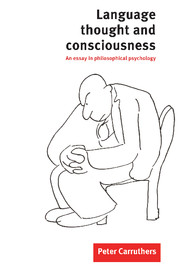Book contents
- Frontmatter
- Contents
- Preface
- Introduction
- 1 The geography of the issues
- 2 Which language do we think with?
- 3 Thought-based semantics
- 4 Holism and language
- 5 First steps towards a theory of consciousness
- 6 Second (-order) steps towards a theory of consciousness
- 7 A reflexive thinking theory of consciousness
- 8 The involvement of language in conscious thinking
- Conclusion
- References
- Index
Conclusion
Published online by Cambridge University Press: 01 June 2011
- Frontmatter
- Contents
- Preface
- Introduction
- 1 The geography of the issues
- 2 Which language do we think with?
- 3 Thought-based semantics
- 4 Holism and language
- 5 First steps towards a theory of consciousness
- 6 Second (-order) steps towards a theory of consciousness
- 7 A reflexive thinking theory of consciousness
- 8 The involvement of language in conscious thinking
- Conclusion
- References
- Index
Summary
In this brief concluding section of the book, I shall pull together the various threads of my discussion, reminding the reader of its starting point, of its main lines of argument, and of its major conclusions.
Recall that the inquiry has taken place against the background of a number of assumptions, set out in Chapter 1. Most importantly, I have assumed a form of realism about the mind and its propositional attitudes. I have assumed that beliefs and desires are real internal states of the agent which interact with one another causally to produce other mental states and behaviour, and whose existence can be independent of our best behavioural evidence. And I have assumed that our common-sense conception of the mind not only contains an implicit theory of its structure and function, but also that the theory in question is, very likely, broadly correct. Equally significantly, I have also assumed that some or other form of sententialism is correct, maintaining that propositional attitudes are best understood as relations to sentences. The question then has been, ‘Which sentences? – those of public language, or those of Mentalese?’
I have also made a number of modularist and nativist assumptions, although slightly less weight has been placed upon these in the argumentative structure of the book. I have assumed that the mind is (more or less) modular in structure, consisting of a number of isolable – and largely isolated – functional components, whose contents and principles of operation have a significant innate component.
Information
- Type
- Chapter
- Information
- Language, Thought and ConsciousnessAn Essay in Philosophical Psychology, pp. 277 - 279Publisher: Cambridge University PressPrint publication year: 1996
